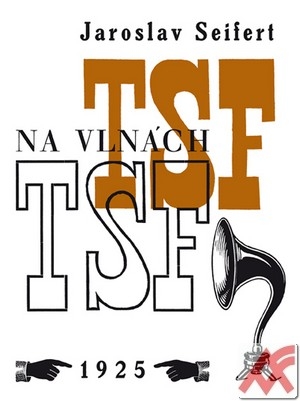On the Waves of TSF / Na vlnách TSF
Knihu On the Waves of TSF / Na vlnách TSF aktuálne nie je možné zakúpiť v žiadnom z porovnávaných e-shopov...
Krátky popis
The famous modernist manifesto Revolutionary Anthology Devětsil,
published in the winter 1922, lists two editors, Jaroslav Seifert
(1901–1986) and Karel Teige (1900–1951). Similarly, we should
preface the 1925 collection Na vlnách TSF (On the Waves of TSF)
with the names of these two authors, leading representatives of the
Czech avantgarde between the two World Wars and founding members of
the artists’ group Devětsil. Karel Teige laid out the verses of his
friend Jaroslav Seifert as striking typographical poems.
Purportedly, he “depleted” nearly all the font cases he could find
at Obzina’s printing shop. In any case, he faithfully fulfilled the
precepts of poetism about the world and poetry—to be multisensory.
Imbued with “all the beauties of the world,” Seifert’s verses are
introduced with a mischievously reversed paraphrase of Karel Hynek
Máchas (1810–1836) famous words: Light grief on the face / Deep
laughter in the heart. With the effortlessness mimicking wireless
transmission, Seifert and Teige transport us to Paris (Seifert
visited the City of Light with Teige in 1924), to places where
pineapples grow, to Australia, Marseille, New York, to distant
ocean shores, and back to the banks of the Vltava river in
Prague—all this facilitated, as it were, by Télégraphie sans fil
(literally from French: wireless telegraphy). To be sure, the
greatest concern of the lyrically gloomy narrator is joyfully
unambiguous honeymoon destinations, if die we must, let us die of
love... In subsequent editions (1938), Seifert’s youthful manifesto
was titled Svatební cesta (Honeymoon). Understandably so, because
the changed circumstances of Czech poetry hardly allowed for
stepping into the same river twice, the former associates parted
ways in their creative endeavors. Teige became a multifaceted art
theoretician and embraced surrealism. After breaking with the
communist party in 1929, Seifert became a lifelong social democrat
and devoted himself primarily to newspaper journalism. The first
edition of Na vlnách TSF gradually became rare until only reprints
allowed us to explore the sources of this visual, almost hedonistic
poetry. As a reprint, the collection is appearing for the fifth
time, this time in its most faithful facsimile incarnation and in
two independent permutations—in the original Czech version and as
an English-Czech remake by Zdeněk Trinkewitz, translated by Dana
Loewy. The Czech-born translator lives in the United States where
early in her career, she won a student translation prize by the
American Translators Association (1992). Subsequently, she received
an honorary mention by the foremost Czech translators association
and her translations of Jaroslav Seifert’s early work were
published in 1997 by Hydra Books, a division of Northwestern
University Press.

